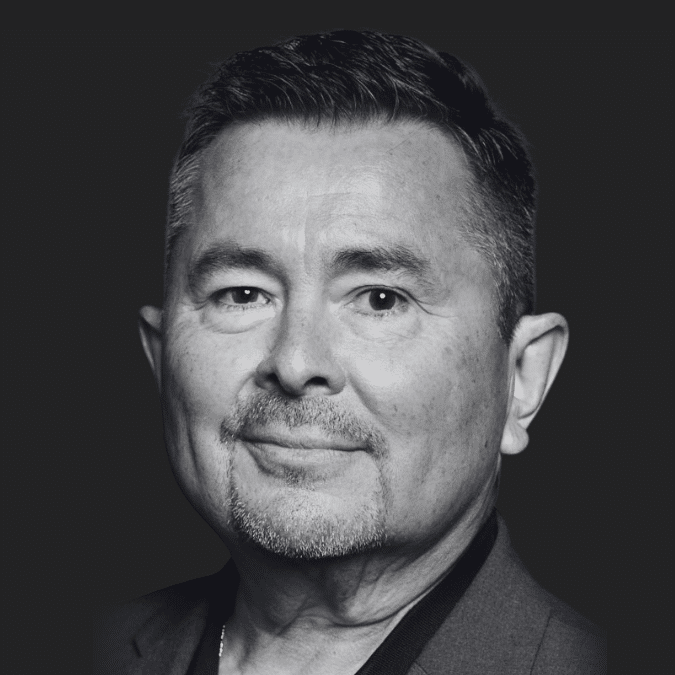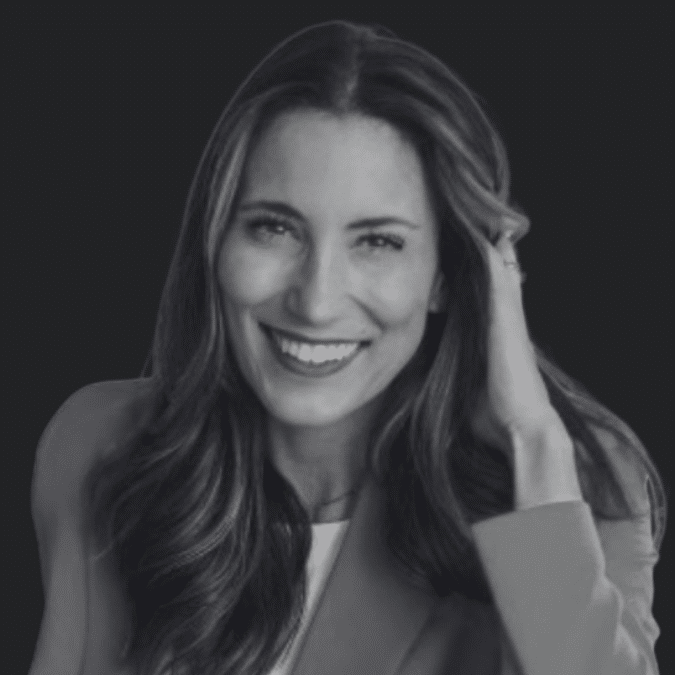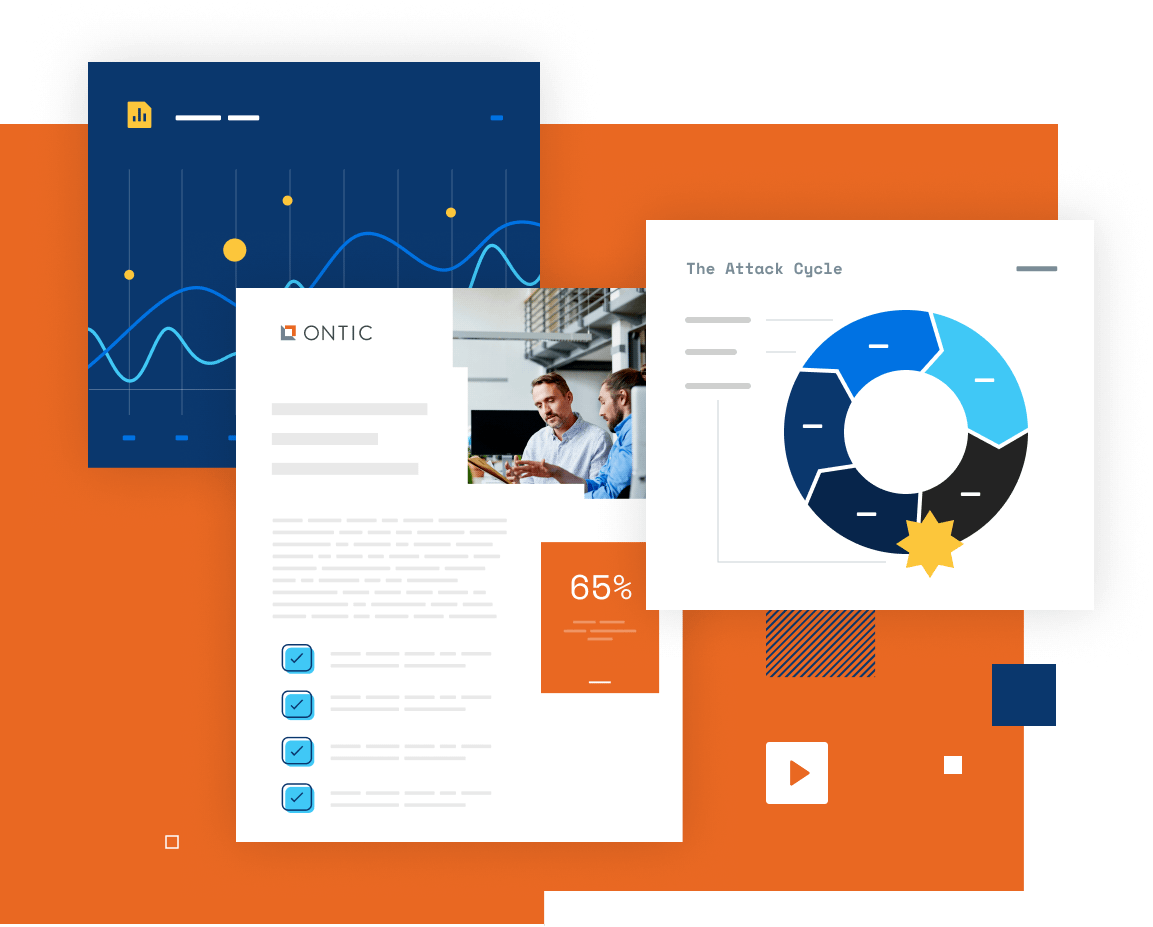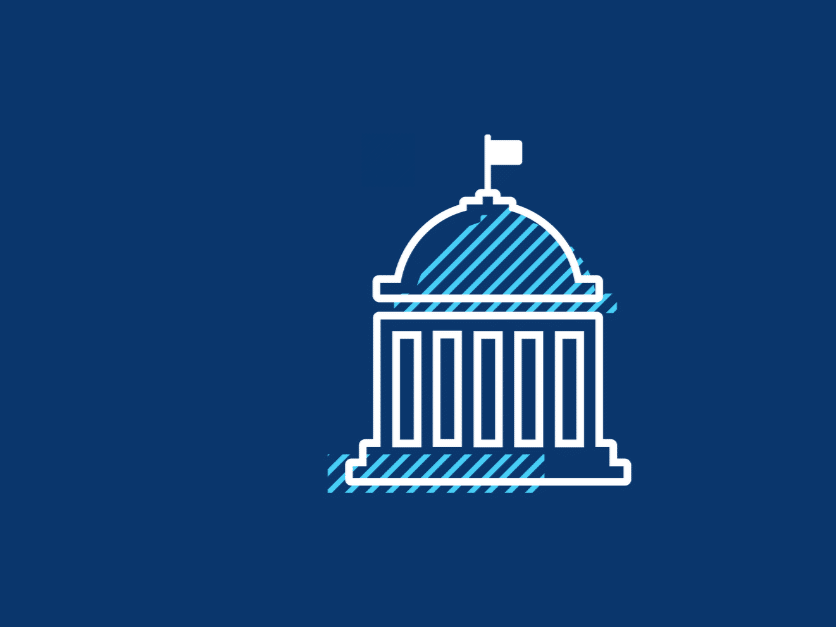May 28, 2025
Empathy and Leadership: Transforming Corporate Security Cultures with John Rodriguez
Connect with us wherever you get your podcasts
In this episode
This episode of the Ontic Connected Intelligence Podcast continues to honor Mental Health Awareness Month with a compelling conversation about mental health in the corporate security field. Hosted by Manish Mehta, this episode features John Rodriguez, founder of Empathic Security Cultures LLC, and Allison Macalik, Director of Solutions at Ontic. Together, they explore the critical need for fostering psychologically safe workplaces, break down the stigma surrounding mental health, and discuss how personal and organizational change can create lasting impact. John shares his 43 years of corporate security experience and unique insights into the intersection of security leadership and mental wellness. Tune in for actionable strategies to prioritize mental health at work and beyond.
Similar episodes:
- Empowering Teams Through Mental Health Awareness with Elda Baez
- Fighting Imposter Syndrome and Leading with Vulnerability
- Why We Should Be Concerned About the Mental Health of Protectors
- Shields Down: Addressing Mental Health in the Security Industry
0:00
Manish:
As we continue to bring awareness and spark conversation around mental health and security for Mental Health Awareness Month, this episode, we are once again welcoming back Alison Macalik, my colleague and fellow on Titian. Alison is a passionate mental health advocate who brings a personal and powerful perspective to our conversations. She’ll be joining our guest, John Rodriguez, as we explore the critical topic of mental health in the workplace. John Rodriguez is the founder of Empathic Security Cultures, LLC, with over 43 years of corporate security experience. A former chief security officer himself and international security leader, John is recognized for his innovative people-centric strategies that have driven measurable business and cultural success. He is passionate about fostering psychologically safe workplaces and developing the security culture professionals attributes model, which is trademarked, to guide organizations on their security culture journey. Please join me in welcoming both Allison and John to the Connected Intelligence Podcast. Allison, we love this month, the month of May, especially given this particular focus. You’re incredibly passionate about this topic. Why don’t I turn the baton over to you to lead the conversation?
Allison:
Thank you so much, Manish. Yes, this is a very fun, exciting episode because John and I are now old friends. We did the panel together at Summit for mental health and I got to know John and he is so incredible and such a perfect person to talk about mental health in the workplace. So John, welcome to the podcast. We’re happy to have you.
John:
Thank you very much, Alison, Manish. It’s an honor to be here, and I’m so proud of Ontic. It speaks a lot to your culture, and we’ll talk about that.
Allison:
Yeah, I think this is your second time on the podcast, right?
John:
Yes. I talked to Fred Burton, I guess, over a year ago on the same podcast that you all have, and we had a really good discussion, and I look forward to continuing it.
Allison:
Welcome back. We’re so happy to have you. Let’s go ahead and jump in. So can you start off and share a little bit about your journey into the world of corporate security and then also how mental health in parallel became such an important focus for you?
John:
Sure. I’ll show my age. I’m 65 on my home stretch of my career. And I’m going to keep going because the things we’re going to talk about and the purpose of helping folks, not just in the art profession, but in society. And we’ll talk a little bit about the volunteer work I do and the purpose. So my career started in 1982. I graduated from North Texas with a degree in criminal justice. I always thought I was going to go into law enforcement. The last semester of school, General Motors announced in one of our classes that they were looking for a proprietary security officer. Back then, the misconception, the bias of security officers was, like many people have, unfortunately. Salary was incredible. I forgot what it was back then. Long story short, I applied, I was fortunate to get hired, and it opened up an incredible perspective of what corporate security does. I was in the parts division, the counterfeit parts, workplace violence. Unfortunately, the The going postal events were starting to happen, the friction and so forth. So I started back then on midnight shift at the bottom rung and fortunately worked there and was promoted. And then I went on with Levi Strauss on the corporate staff in charge of half of the U.S. and Latin America. And that’s when NAFTA started. The first NAFTA was being discussed in the early 90s. I saw a niche area there, and I opened a consulting firm after 13 years of pure corporate security experience. And back then, security technology was basically non-existent compared to what you all provide now. And we’ll talk a little bit about that now or later. The cameras were all tube cameras and black and white little nine-inch monitors and so forth. But anyway, then I went on. My career went from Levi’s, then I worked with Kimberly Clark. After 10 years of consulting, And I wanted to do that for different reasons. Then after Kimberly-Clark here in Austin, a company called Temple Inland, we got bought out after two years by International Paper. They’re the big company, the big player on the block. But I had reached one of my goals of being the CSO, and I did it for a couple of years. And I was debating, do I look for another one or focus on the family? And by that time, financially, the financial plan was doing fine. So I went on and got a number two job, a director job with Cardinal Health in the pharmaceutical area and got to stay here in Austin for 10 years. So my minor was in a double minor in psychology and sociology. So that’s the beginning of my tie to understanding human behavior. And I really enjoyed, and now I teach, our security profession, I look at it as science and art. Science are all the systems, the procedures, the manuals, hiring teams, and so forth, supply chain security, travel risk management, the data analytics, the AI, all the great work that you all do. And I’m familiar with what you do. And the other part is the art of human connection. Some people call it soft skills, but one of my courses is called soft skills are the hard skills because they’re so complex and human. We’re all different every day and interacting with each other means something different to each other every day. So having that background, one of my professors wanted me to get a doctorate in sociology, and I always loved psychology and that interaction. And those first years with General Motors, it was union versus management, the UAEW, which is still going strong in the auto industry. They were always in conflict and always contract-based. There was very strict rules, but anytime there was a disagreement or issue to resolve, I really focused on how both sides would resolve issues from the human aspect. I don’t want to get too deep because there’s a lot of questions. So I’ve always loved human interaction. I’ve studied it. I think that’s part of my success and part of my ability to later transition. Neuroscience became clearer and how neuroscience and psychology and social psychology came together. So halfway through my career, I started studying it on my own. You know, a lot of folks think, well, if you don’t have a PhD in psychology, then you haven’t made it. Well, I can read and I’m pretty smart. So, you know, I don’t, I think I could understand and read and learn from people what I needed to be the best security professional that I could. Years ago, a loved one in our family was diagnosed with a mental health condition, and that changed our life. And I dove even deeper into understanding mental health. Part of the resources that I found years ago was NAMI, the National Alliance on Mental Illness. And they have one of the features or one of the services they provide are support groups for folks that have a mental health diagnosis for them to get together anonymously throughout the city. And the other group was family members that had family members going through a mental health journey. And that’s the one that I joined. It was so helpful that I decided to get certified as a family support facilitator. And I do it twice a month. I’m gonna do one tonight here in Cedar Park. So the connection at work, my last companies was with HR and the simplest connection for a lot of the listeners in the security profession is the workplace violence phenomenon that’s been around for years and the connection with behaviors and reactions and stressors. I saw the connection there and I worked with businesses to do more things in the mental health area. So I’ll stop right there and now you have some other questions.
10:20
Allison:
No, that was very helpful. Thank you for walking us through how you got to where you are today. Was that moment because it sounds like there were a lot of different things that were happening to get you where you are with mental health. Was it that moment with your family member or was it your minor or, you know, all these different things that led you to create your company and be so passionate and be such an advocate about this.
John:
Yeah, good question. I think, you know, you hear about innate things that are just part of our character and the nature and the nurture component. I think part of my makeup was being compassionate and empathetic and trying to understand folks. Combined with those early formative years, I think with GM, seeing conflict resolution and discussion really were foundational. And it grew through there. And I didn’t name or define or clarify what I said a few minutes ago about how I see our profession as science and art, and they’re both critical and they’re both symbiotic. Without technology and without the human connection, you can’t be as good as you can be, as a company and as a security profession, as a company leader to protect the people and to protect the assets. So I think the event with the family member solidified my purpose in my point in my career. As I mentioned, the financial plan was fine, so I had more ability to understand purpose. There’s a book by Viktor Frankl, Man’s Search for Meaning, which is one that I really recommend folks to understand. And one of the things that I say, and I said it during the, when we were together, I was with Elda and Arian at the event. I like to say that there’s three groups of people in the world. There’s those of us that have been diagnosed with a mental health condition, and I was diagnosed with PTSD and anxiety in my life. And I’m very proud of sharing that. And that’s part of breaking down the stigma, especially in our profession. So that’s the first group. The second group of people are those of us that have friends or family that we love and we care for and we want to understand what they’re going through so we can be there for them as best that we can. And the third group is everybody else that sooner or later will be in group one and/or group two, right? So breaking that stigma barrier is critical. With any person, and especially the security profession, the other thing I like to stress is that our health is made up of four parts. Our physical health, our mental health, our emotional health, and our spiritual health. And in spiritual, I don’t mean religion, it means a greater connection to something bigger than you. It could be nature, it could be animals, finding that purpose to serve others or nature or other people. So if you can balance those four things and they’re all interconnected, if you don’t care for those, the more you care for those four categories, the better security professional you’re going to be, because it’s a stressful profession. There’s uncertainty, there’s the speed that things are happening. Business leaders, employees look at us as the problem solvers. We have pride in that. So I think our profession is unique. It’s a wonderful profession because every day is different. I love it. Some people aren’t cut out for that. They like structure and organization, and that’s fine. They strive in that. But for security professionals that don’t embrace uncertainty and a non-linear journey, I think it gets back to those four, you know, physical, sleep. And we can talk about just the physical on another call. I can talk for a long time. Sleep, nutrition, exercise, being outside, getting sunlight and connected to mental and emotional health.
Manish:
What a remarkable journey, John, and perspective, and thank you for giving back. We deeply appreciate it.
John:
My pleasure. And it’s the stories that we see in those NAMI, National Alliance on Mental Illness, groups, they rip your soul apart because the pain, you talk about empathy and compassion. It’s really hard. And there was one, and every family has a different story. And I remember one lady, it was a grandmother. And her daughter was diagnosed with schizophrenia here in Austin, living out of her car with two little kids. So the grandmother was trying to get legal custody of her grandkids, just to get them in a house, get them out of the car. So you’re there with 10 to 15 families with similar stories and you’re leading that and you’re trying to support them, you talk about purpose and fully engaging your own soul. And there’s debate about empathy burnout and compassion burnout, but I’m convinced and the experts say that You can never get burned out giving compassion, doing something for somebody. In the medical profession, our daughter’s a nurse during COVID, and even now, and even before and after, you hear about empathy burnout, that they try, but there’s just a point. So anyway, I know we have some more things to, I could talk about this stuff for a long time. So what else do you wanna chat about?
17:37
Allison:
I do want to talk about something we talked about at Summit, and I love how head-on you address this topic. So we were talking about mental health in the corporate security world, specifically for men in security. And I’ve never really heard someone be as open and honest and vulnerable talking about this specifically. And I would just love to understand, first of all, why do you think it’s such a challenging topic for men specifically in this field? What are some common misconceptions and how do you address them?
John:
So let’s start backwards and going back to NAMI and those family support groups. I’ve been doing that for going on almost seven years and it’s non-scientific but probably 80% of the 10 to 15 people that show up to a session are women. In my unscientific opinion, women are stronger than men in the emotional, I think, in mental health side. That’s, again, just what I’ve seen and what I’ve experienced. People are going to probably say, hey, you’re crazy. And it is crazy because it’s case by case. It depends on every person. But what I’ve seen and what I’ve lived through, I think, what happened to the men, and I hear the stories, they leave. They leave the family. It’s just sad because they have a loved one that is going through a life-changing journey. you know, they don’t stay there. Does it equate to, how does it, does it and how does it equate to the profession? I think that then you go back to our profession and historically, since the industrial age, you know, men were the muscle, the enforcer, the physical bodyguards, and you can study the the labor riots and disputes, the Wildcat strikes with Ford and GM way back, and who were the enforcers to protect the industry. Then throughout the 50s and 60s, former law enforcement were the easy go-to person. But I think that the requirements were a lot more simple back then. I mean, it was access control. pretty much, and conflict resolution. If somebody stole something or somebody threatened somebody, the security officer or head would step in, right? Then the 80s and the 90s started to evolve really fast. And I think that’s where women really got involved, and they came in from different agencies, from law enforcement, through business, or like me, and they did just as good or better, I think. And they brought And again, that’s a broad generalization. They brought in a different perspective of those four health categories, in my opinion. Again, there’s some great men and there’s some poor women in those four categories. That’s totally broad-based. But to your question, I think it’s just the percentages. There’s more men still, unfortunately. I know that women are really doing great. And I mentor, I’m part of the OSAC and ISMA mentoring program. And my first choice is to work with women to try to explain and share the things that I’ve learned. You remember the movie, the Matrix. I think it was the first one when Neo gets, they sit him in the chair and they plug that probe and he downloads and he says, I know Kung Fu, right? So that’s what I try. When I mentor people, I tell them it’s going to be a long journey. It could be a year or two. And there’s some women that I still mentor years later. And I try to convey everything, the science and the art, to them. But back to the original question, I think the concept of the protector, the guardian, the person at the gate, you know, facing the invaders, different ways, analogies to name it, and the security professional takes that on and doesn’t want to fail, doesn’t want to let the company down, doesn’t want to let the employees down, doesn’t want to let themselves down, their family down. And then I think there’s a fear factor of being vulnerable to say, hey, you know, I’m really struggling. I’m going through a divorce or my grandmom died or my dad died. And it’s, I’m not in a good place right now. You know, and that’s all reasonable, that’s all understandable, because we all go through it. But even those examples, some folks don’t want to be vulnerable. And that’s, that’s the key. But people are perceptive, we have, you know, you hear about the sixth sense, it’s called neuroception, we can sense emotions to some degree, I believe. And if a leader, and Arian Avila is a fantastic role model for that. And there’s a bunch of other ones, right? It’s changing gradually, but it should be faster. And there’s some things I work with. as is a lot, I’m a 30 year ASIS member, and we’ve done several mental health related professional development, global webinars, and people are providing some really good feedback there. So I think the security leader needs to be honest with themselves. Think of those four healthcare categories, physical, emotional, mental, and spiritual, and make a decision. Are you gonna try to be the best person, not just at work, but at home, that you can be, or you wanna continue at the level, and that might be a good level, and that’s good for you, but it’s just an individual, I think, choice that we all make.
Manish:
Wow. Allison, this really should have been a two-hour podcast. John is very, very deep. We only have time, unfortunately, for maybe one last question, and we only have a couple of minutes left. So, Allison, I’ll turn it to you.
24:54
Allison:
Yeah, so I just want you to dive in. You were talking about the person and working with individuals. What about on an organizational level? So maybe someone who’s listening is a leader and they don’t really know what to do or how to even start. We’d love just your opinion on, this is a great resource. I know you’ve mentioned a couple, but really kind of changing the culture of a corporate security company and how to go about that.
John:
Great question. And as I mentioned at the beginning, thank you Ontic for doing this, because this is the second year and you all didn’t have to do this and you did it because that’s part of your culture. And I hope that every employee or associate in Ontic gets to listen to this and gets to hear me say, you know, you’re senior leaders and it’s important for you to do this. And not just because May is Mental Health Month, which I don’t like. I mean, every day is mental health moment for ourselves, right? So I think it starts to your question, it starts with us as individuals, we have to look inwards and decide, do we want to embrace, do we want to break down our own barrier? And we all have issues that we’ve all grown up with since childhood that may set us back, that may set us back from being better, or being more vulnerable, or being a better friend, or a leader, or team leader, or family member. So it starts with us, and you can do it quietly on your own. You know, you have your personal journey, you can find there’s a ton of resources online, NAMI is an excellent one. There’s some great books, you know, there’s one that is called What Happened to You, and I’m looking at the notes, Oprah Winfrey and Dr. Bruce Perry. It’s what happened to you. Instead of the concept, it’s not what’s wrong with you. It’s what happened to you, understanding what happened to you throughout your life and how your neuroplasticity, the things, things can get better. So it’s not, this is my life, I experienced this divorce, or I can’t keep a relationship, and that’s me, that’s wrong, because you can get better. But you have to understand yourself, and you have to do the work. And that’s the other book by Nicole LePere, she’s also a psychologist, and it’s called How to Do the Work, a motivational self-healing book. So those are just a couple that I’d highly recommend. Then, the other step to your question is to understand the company culture towards mental health. Companies understand that the stressors are there. But you go back to the basic concept or principle of any business, and that’s maximum profit with minimal expense. I don’t care what business you’re in, right? And the challenge is that the C-suite leaders have to weigh do we do more for mental health and get the benefit of more employee engagement and more talent retention and more innovation and more productivity? And what’s that going to cost us? Is that going to cost us more of employee assistance programs or hire somebody like me to come in and work with the folks as a non-clinician? And that’s one of the benefits that I bring to companies is when people hear me speak, they see me as a peer, just as a guy that’s a flawed, cracked vessel, right? So the connection with people is stronger and faster versus somebody reading off the poster about the benefits of how EAP works, right? Huge difference. And one of the challenges I tell CSOs is, and talking about mental health. Can you stand up in front of an employee in a security awareness meeting and talk about EAP and the benefits without a PowerPoint for 15 minutes? And I spoke at the ASIS CSO Center last year, and that was one of the challenges and one of the eye-openers and takeaways for them to do. So there’s rote learning that you memorize, and there’s things that you feel and are important as a value. So those are just a couple of several, a lot of other things, and I know we don’t have time.
29:51
Manish:
Wonderfully said, we are unfortunately up against the clock. So John, we end every podcast with one last question. And maybe if you could think about one sentence, maybe two, of what does Connected Intelligence mean to you?
John:
I think it means success, and it means succeeding with the science and the art. And the art of leading a company like Ontic and I’ll say it again for the third time and it’s not a lot of companies don’t do what you’re doing right so if you promote that, just looking at your own Ontic family and corporate success is one thing, but in the traditional corporate security, you know, perspective, it’s combining everything you do, all of, and I know you will, all the innovative things that you do and provide to companies with the CSOs that understand the art of human connection. They have to be the best that a company can be and to use that data analytics and the speed and the structure and the metrics and quantifying things. Having that culture of care, the companies really see people as assets. you bring the non-empirical components. Because at the end of the day, companies need information about wrongdoings, simple things. The door reader’s not working. There’s a stranger in the parking lot. Somebody made a threat. Somebody’s looking for drugs. Employees know what’s going on. Until they get that data reported to the security department to get it into your system, to then let the Ontic systems do the fantastic work to sort out things to go back and address the issue, it’s symbiotic. So the symbiotic, seeing it as two to make Connected Intelligence the best you can is how I would describe it.
Manish:
Very well said, Allison. We should make this a series. Allison, thank you for joining and leading the conversation today. And of course, thank you, John. We really appreciate your insights and hopefully we’ll talk again soon.
John:
Thank you for having me.
What you’ll learn
01
How leaders can break down mental health stigma and foster a culture of psychological safety in corporate security
02
The impact of mental health on security professionals and actionable steps individuals and companies can take to support well-being
03
Insights into balancing technology and human connection for effective security leadership
More about our guests

John Rodriguez is the founder of Empathic Security Cultures, LLC, with over 43 years of corporate security experience. A former Chief Security Officer and international security leader, John is recognized for his innovative, people-centric strategies that have driven measurable business and cultural success. He is passionate about fostering psychologically safe workplaces and developed the Security Culture Professional’s Attributes Model™ to guide organizations on their security culture journey.
Connect with John
Allison Macalik is a seasoned leader with over a decade of experience in the Presales and Solution Engineering field. Known for her strategic mindset and emotional intelligence, Allison is deeply committed to empowering others and helping them find their voice. She founded the WISE chapter at Salesforce.org, coaches with the Presales Collective, and co-created 4under3, where she co-hosts the Imposter Talks podcast and facilitates Fight Your Imposter workshops for ERGs worldwide. Guided by her core values of fairness and vulnerability, Allison brings this ethos to her role as Director of Solutions at Ontic, inspiring others through her work and leadership.
Connect with Allison



